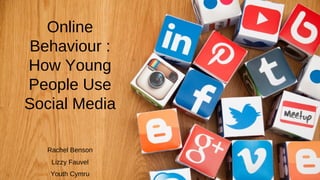
Cyberhate Workshop: How Young People Use Social Media by Youth Cymru
- 1. Online Behaviour : How Young People Use Social Media Rachel Benson Lizzy Fauvel Youth Cymru
- 2. Youth Cymru and Llais Ifanc National youth work charity Young people aged 11-25 and the professionals who work with them Llais Ifanc – Young People’s Leadership and Advisory Panel CEOP Ambassador training
- 3. What social media do young people use?
- 4. What social media do young people use? Messenger Facebook Vine Instagram Snapchat Whats app Tinder Youtube Ask.fm
- 6. The number of internet users surpassed 3 billion in 2014 Worldwide connectivity Real time information sharing
- 7. How many years to reach 50 million users? Radio TV Internet iPod Facebook
- 8. Digital natives Cannot separate digital world from ‘real world’. Young people have to negotiate them all. Young people aged 16 – 24: 74% use a social network For young people aged 12-15, 36% of their media time is spent on social media (double the rate of adults) The NSPCC estimates that around half of the UK’s 11 and 12 year olds currently have a profile on a least one social networking site which has a minimum age of 13
- 9. Online behaviour Accessing support and information Exploring and expressing identity (Trans*Form) Developing skills Real time information sharing (eg. Periscope) Employability
- 11. Online Behaviour and Young People’s Rights Article 12 – Children have the right to say what they think should happen when adults are making decisions that affect them and to have their opinions taken into account Article 15 – Children have the right to meet together and to join groups and organisations Article 16 - Right to privacy Article 19 – Right to safety Article 24 - Right to health Articles 28 and 29 – Right to education. What rights based issues do young people face in a digital world? What can organisations working with young people do to ensure young people can access their rights?
- 12. Resources CEOP Youtube channel Thinkuknow - http://www.thinkuknow.co.uk/ Welsh Government - http://hwb.wales.gov.uk/pages/eSafety-Resources
Editor's Notes
- CEOP – National Crime Agency Examples of how YC benefits from social media CEOP Ambassador training
- Can you recognise any of these and their purpose?
- Tencent – Asia. Used in China where facebook has been blocked. Important to understand the context of online behaviour. If this conference was taking place 10 years ago we’d be having a very different conversation – one family computer in the living room etc.
- Radio – 38 years TV – 13 years Internet – 4 years iPod – 3 years Facebook added over 200 million users in less than a year
- ‘Banning’ social media now possible or effective.. Young people, parents and practitioners need more education and information about how to navigate online and stay safe.
- Periscope enables live broadcasting. Ferguson (America) Democratic engagement – votes online? Plan UK international research – gendered view of social media. Girls being left behind – ‘Communications technology can reduce social isolation, help develop new skills, open opportunities for employment and participation, increase knowledge and awareness in areas like health and rights, build self-esteem and help keep girls safe. - See more at: http://www.plan-uk.org/news/news-and-features/girls-mobile-technology-and-the-internet/#sthash.IDFAZkaZ.dpuf’
- Gendered – girls. Ask.fm Trolling Sexual messages – Trans consultation Suicide Self esteem Cyberbullying Pornography, sexual messages, gambling, violence, self-harming, anorexia, grooming, religious and political radicalisation Lacks emotional connection Decreases face-to-face communication skills Conveys inauthentic expression of feelings http://www.rootsofaction.com/disadvantages-of-social-networking/
- The UNCRC protects the rights of young people up to the ages of 18. The UNCRC has 54 articles, 42 of which are rights belonging to children and young people up to 18 years of age. In 2011, Wales became the first country in the UK to make the UNCRC part of its domestic law in the Rights of Children and Young Persons (Wales) Measure (2011).